An Exceptional Problem: How police are clearing rape cases without making arrests
Many suspects in rape crimes that are exceptionally cleared are still on the streets even though the case is considered solved.
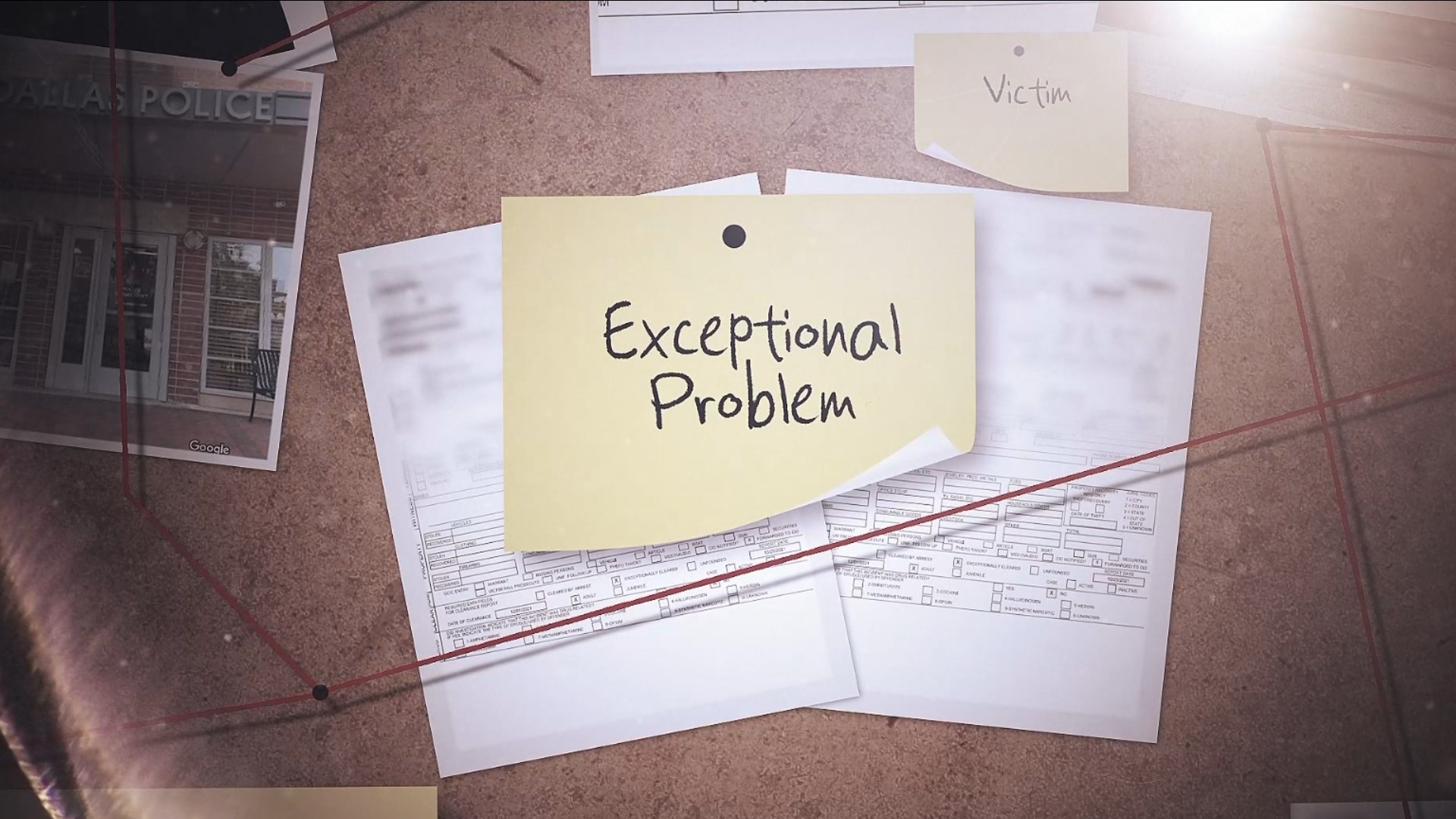
All Christian Parks said she wanted was justice.
"He knows what he did," she said through tears.
At 19 years old, Parks filed a report with Dallas, Georgia Police saying her boyfriend sexually assaulted her.
"He did stop and say he was sorry after, much after I said, 'No, please stop,'" Parks recalled.
Dallas PD closed her case, saying the case lacked evidence. Christian knew her case was closed, but she didn't know police also marked her case "Exceptionally Cleared."
What is Exceptional Clearance?
Exceptional clearance is something police can use to clear a case when they can't arrest a suspect for reasons beyond their control. For example, the suspect is dead, is already in prison, or the victim no longer wants to pursue charges.
But first, police must identify who and where the suspect is and have enough evidence to make an arrest. That means Christian's case could not be exceptionally cleared, but police did it anyway.
"That makes me so mad," Christian said when 11Alive explained to her how her case was marked.
Retired police sergeant and expert on exceptional clearance Liz Donegan said misusing exceptional clearance is a big deal.
"The public is under the false impression that we have solved a crime and a rapist has been held accountable," she said.
That's because, in policing, a case marked exceptionally cleared appears the same as one solved by arrest. Yet, in reality, the suspect is still out there.
Incorrect markings are common
Our investigation found Christian's case isn't the only one mismarked by Dallas Police. In fact, all four of the department's exceptionally cleared rape and sexual assault cases reported in 2021 were incorrectly given that label.
11Alive investigators contacted Dallas Police about our findings and the department admitted it made a mistake. Those four cases are now marked "inactive." This means the case no longer looks solved, and it can be reopened if more evidence comes to light.

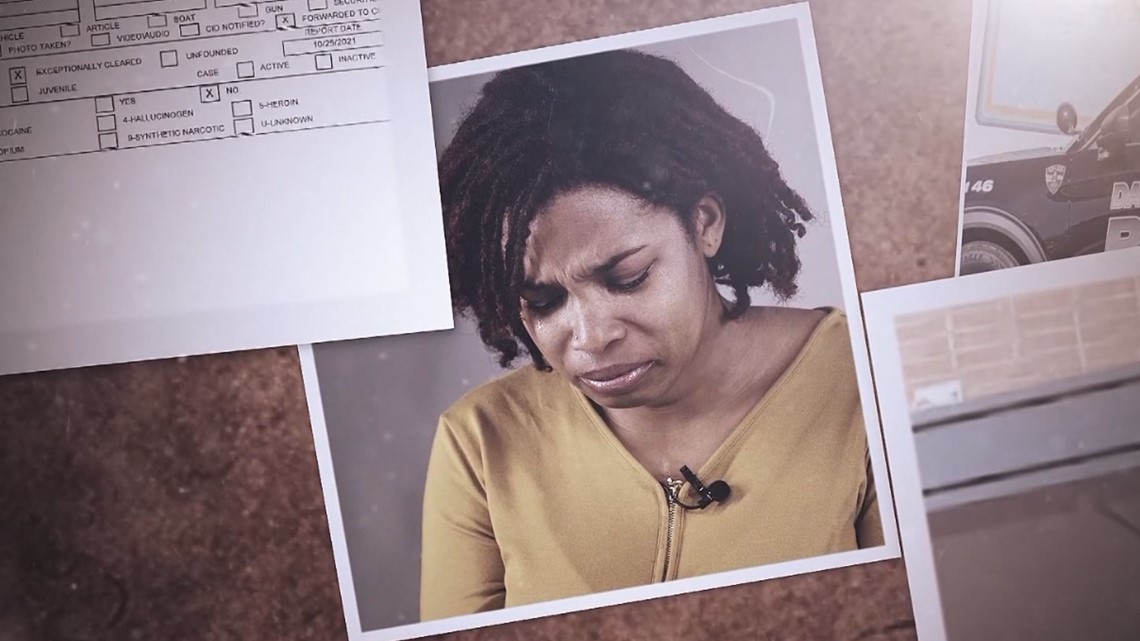
Afterward, Dallas Police did not return our multiple requests for an on-camera interview.
Meanwhile, Christian said something needs to change.
"They (the suspect) get to continue to live their lives. They don’t have to go to therapy and relive those moments," she said. "They don’t have to think about it."
It's happening across the state
Our investigation doesn't end here, and it doesn't stop in Dallas, Georgia.
11Alive investigators researched this issue for more than a year and uncovered many departments are misusing exceptional clearance. It gives the appearance that rape cases across the state are being solved at a higher rate than they actually are.
The misuse of Exceptional Clearance
Robin Smith-Bright had never heard of exceptional clearance, even though it is why her daughter’s rape investigation is closed.
It's a little-known way where police can clear crimes without ever making an arrest. 11Alive found when it comes to rape, it’s far from an exception.
“What is that?” Smith-Bright asked.
It’s supposed to mean police couldn’t arrest a suspect for reasons beyond their control, even though they have the evidence they need. Those reasons can be anything from the death of the suspect, the victim not wanting to prosecute, or the suspect is already in custody for another crime. That’s not how Evans County used it in Smith-Bright’s daughter’s case. They exceptionally cleared it – citing a lack of evidence. Sheriff Mac Edwards didn’t see a problem with that.
“My exceptionally cleared, the previous sheriff’s exceptionally cleared might be two different things,” Edwards said.
We explained there is only one definition for exceptional clearance. Edwards said, “It’s a play on words I guess.”
No, it’s not.

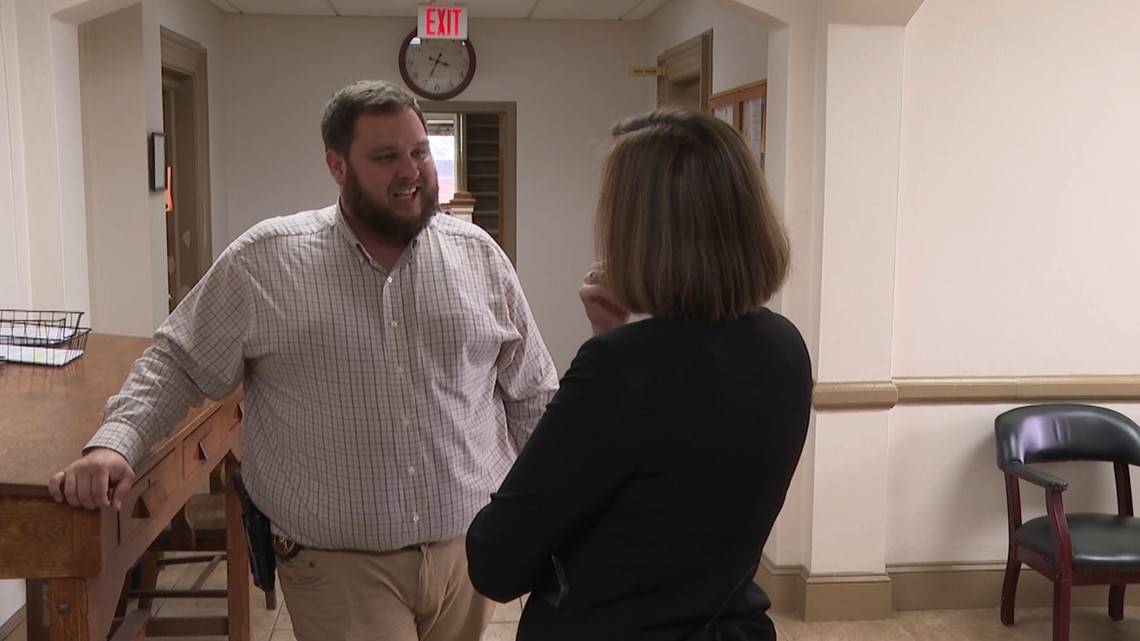
Exceptional clearance is the same no matter your state, city or county. The FBI lays it out clearly. Every agency must determine who the suspect is, where the suspect is and have enough evidence to make an arrest. Then, they need to have an exceptional reason on why they can’t arrest the suspect. If they can’t do that – the case doesn’t qualify.
There’s a high threshold because when police report their numbers to the public, exceptionally clearing the case is the same as solving a case with an arrest. That’s why it should be relatively rare, but we found that’s not the case in rape investigations.
In 2021, Evans County exceptionally cleared 40% of its rape cases compared to 24% of its burglary cases and 0% for homicide and robbery.
Atlanta Police have a 20% ex-clearance rate for rape compared to 5% for robbery, 3% for homicides and just 2% for burglaries.
It’s an issue across the entire state of Georgia. Eight agencies had an exceptional clearance rate of 40% or higher. Another 24 agencies had a rate of at least 18% or higher.
Dave Thomas, with the International Association of Chiefs of Police, said anything over 9% is alarming.
“When we start getting in higher percentiles, I want to go in and do some data mining and look at the cases. Look and see whether they met the criteria,” Thomas said.


That’s exactly what 11Alive Investigates did.
We filed open records requests with departments in 48 counties across Georgia. We found agencies that exceptionally cleared cases for “insufficient evidence,” because a story was “fabricated,” or because it was “transferred,” all of it a misuse.
Nearly every department that used exceptional clearance for rapes used it incorrectly at least once.
Multiple agencies acknowledged they made a mistake once we brought it to their attention. But for Bright-Smith it’s not enough. She wants her daughter’s case reopened, and she wants the suspect charged.
The lab that examined the teen was unable to find male DNA from the swabs they collected. The sheriff's office said based on that and some messages they received from the suspect, they didn't have enough evidence for a warrant.
We spoke with Mosaic, a sexual assault and children's advocacy center.
"That is the norm of child sexual abuse. 90% of exams are normal," Kathy Carter said. "A man can wear a condom, so that's going to limit DNA. And the child, adult, whoever the patient is may have showered, cleaned off everything that's going to limit DNA."
You can find an excerpt of the report 11Alive obtained from the sheriff's office below.

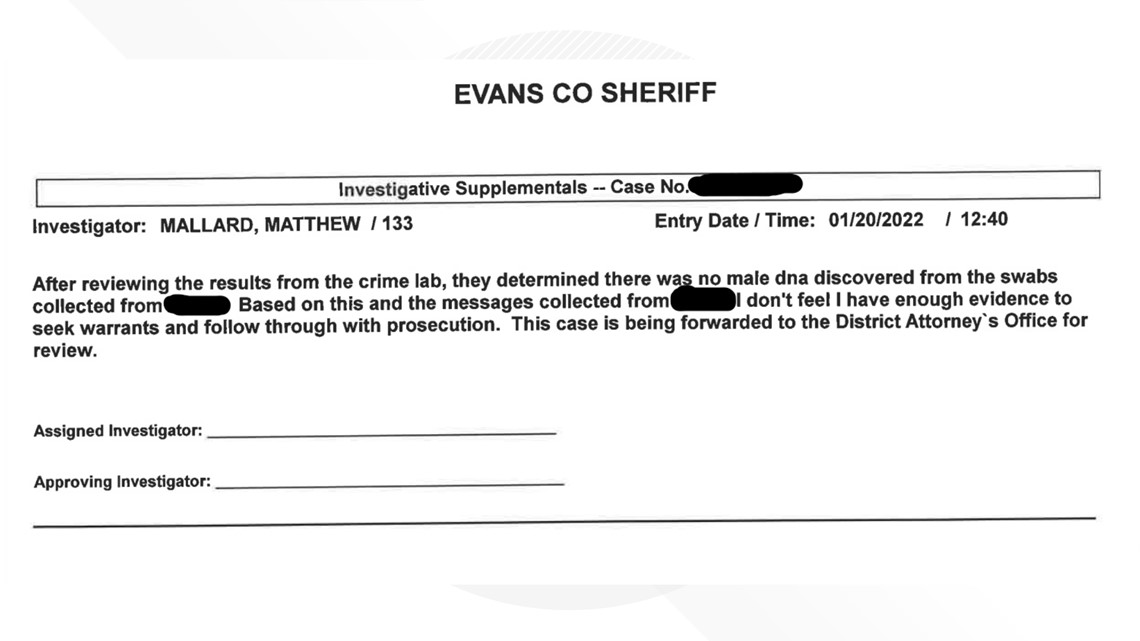
'A disservice to victims'
The Gwinnett County Police Department agreed to sit down with us to explain how they put the practice of exceptional clearance into motion.
“Most of those cases are supposed to be reviewed by the manager above to actually make sure that those, they fall in line with the categories,” Lt. Jason Ayers said.
11Alive looked at the exceptionally cleared rape cases for the department in 2021 and we found in many of them, the suspect was never questioned. We asked Gwinnett PD if officers can get the probable cause they need without questioning everyone.
“All the parties and the witnesses need to be interviewed,” Ayers said.
We then showed Gwinnett County Police that several cases marked exceptionally cleared were done so without ever talking to the suspect.
“Technically speaking by statute you have probable cause with the victim’s outcry,” Sgt. Jennifer Richter said.
“But, we were just talking about that and you said, 'We don’t have that probable cause,'” reporter Kristin Crowley responded.
“I’ll ask our legal advisor,” Richter said as she pulled out her phone to try and get clarification.
However, that wasn’t the only discrepancy we found. One case marked exceptionally cleared was done so because the officer thought the allegation was fabricated. By definition, that case couldn’t be exceptionally cleared.
“What’s the harm? Like, what are we getting at here?” asked Richter, as we pointed out the potential misuse.
“Is there harm in exceptionally clearing something that shouldn’t be exceptionally cleared?” Crowley asked.
“No,” Ayers and Richter said collectively.

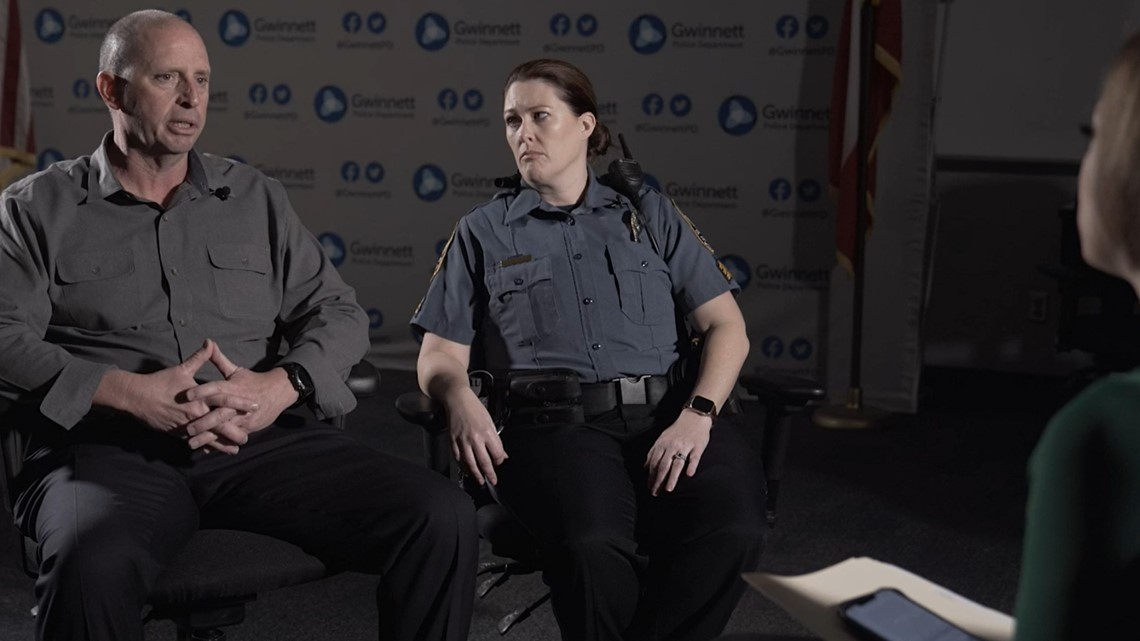
Exceptional clearance experts say that’s not true.
“First, it’s a disservice to victims. Secondly, it’s a disservice to the community. This is the polar opposite of keeping the community safe,” said Dave Thomas with the International Association of Chiefs of Police.
Gwinnett County PD said it had 25 exceptionally cleared sex crime cases. Many of them were given that designation because police said, “The victim would not move forward.” That is a legitimate reason, according to the FBI but only if police have enough evidence to arrest the suspect.
We asked whether Gwinnett County Police would have otherwise arrested these suspects had the victims decided they did want to prosecute.
“If there was evidence,” Richter said.
We explained the problem with that is they need the evidence first before they can ex-clear a case based on a victim not wanting to pursue charges.
"That’s true but in order to establish evidence and establish that guideline of probable cause, you gotta understand it’s not just the victim’s testimony,” Ayers said.
“We go beyond probable cause,” Richter said.
Beyond a reasonable doubt is much harder to prove and the responsibility of the district attorney, not the police.
“Should the police do that?” Crowley asked.
“You’d have to ask the district attorney,” Richter responded.
“But if you’re the ones doing it, I’m asking you. Why? Why are you putting that extra threshold on yourselves?” Crowley asked.
“Because that’s a thorough investigation,” Ayers said.
“It’s our moral duty quite frankly. We can’t just throw people in jail based on someone’s accusation regardless of whether or not the legal principle says that’s enough,” Richter said.
After roughly an hour, the investigators said they were willing to take a second look at the cases we brought them.
“We can examine our practices. We can take a look at that but I don’t think we’re using it wrongly,” Richter said.
“No,” Ayers agreed.
Months after our interview, we reached back out to Gwinnett County PD and asked if they reviewed the cases and their practices. On Thursday, Ayers said he has now reviewed the 25 cases and found exceptional clearance was used questionably in only one case involving a suspect with "mental disabilities."
"However, this case involves a complete investigation, establishment of probable cause, and the victim being unsure of wanting to prosecute, due to the suspect’s mental capacity," Ayers said in a statement in part.
The department maintains it used exceptional clearance correctly for all the other cases.
Survivors of rape often say the experience of reporting their rape to police was traumatizing. Many said they didn't want to pursue a case or charges because of that experience. Here's what these officers had to say.
Justice is hard to come by
Mia Johnson spends every day fighting for her son.
“It’s like I’m living a complete nightmare,” she said.
It’s a fight she feels like she is losing.
“The worst part of it is feeling like nobody believes us,” she said. “And, that nobody’s protecting kids like him.”
In early 2021, Johnson said her 8-year-old son revealed he was being molested. She took her son to the doctor and then to the police. Despite her claims, Johnson said DeKalb County Police would not move forward with an arrest without a statement from her son.
“So, anything I say doesn’t matter?” Johnson questioned as she recalled her interaction with police.
It might not sound unreasonable that police want to hear from the child directly. The problem here? Johnson’s son can’t tell them. Not with words.
Johnson lives with autism and is non-verbal. He can only communicate through pictures and writing. A language, Johnson said, police couldn’t speak.
“They come back and say ‘We couldn’t get anything out of him,’” Johnson recalled.
She said the police told her they would try and keep the case open but they did see concerns.
Two years later, her son’s case remains unsolved. The suspect is still free.
Camille Proctor, the founder and executive director of The Color of Autism Foundation, said there is a high chance perpetrators will get away with these crimes against nonverbal children.
“The fault will be put on the child’s inability to speak,” Proctor told 11Alive Investigates.
A possible solution, Proctor said, is for police departments to provide specially trained therapists for cases like these.
“There’s ways to get the answers from a child that has no words,” Proctor said.
The reality is, even when children don’t have a disability, justice in child molestation cases is hard to come by.
Our team spent a year sifting through more than 600 sex crime case files. We found child sex crimes were often marked closed– or not being worked on– while potential predators were out on the streets.
“I just know that it’s not normal for a 3-year-old to get genital warts,” a nurse is heard saying on police body-worn camera in records obtained by 11Alive Investigates.
This case of a 3-year-old with a sexually transmitted infection was marked closed by Greensboro, Georgia police for lack of evidence. In another case out of Statesboro, a teen claimed her father molested her at least 20 times. Police marked that case inactive.
Then, there’s a case in Gordon County, where a 5-year-old goes into graphic detail about being molested. That case is ruled unfounded.
Whatever the title – these cases are closed or not being worked on. Our investigation also uncovered a number of child sex crimes that appear to be solved even though no one was ever arrested.
For instance, Rockdale County Sheriff’s Office investigated 26 sex crimes against children in 2021. Twenty-two of those cases appear to be cleared. Yet, police only arrested three suspects. The other 19 cleared cases are “exceptionally cleared.” This means police are supposed to have the evidence they need to make an arrest but can’t for reasons beyond their control.
'They are not believed'
Even children, who are coming forward, are still facing hurdles to justice.
Mosaic Georgia is a sexual assault center, which specializes in care for children. CEO and Executive Director Marina Peed said this lack of justice happens because children are not believed.
Kathy Carter, Director of Forensic Medical Services at Mosaic, said children need time to report.
“It takes a long time for children to come forward,” she said. “They're testing the waters. They're seeing, ‘How are you going to respond to me if I tell you something happened to me?’”
In cases like rape and molestation, advocates said justice is falling short.
“Crimes against women and children are not managed very well,” Peed said.
A reality Johnson knows all too well.
“Unfortunately, I can see it ‘cause it’s happening to me,” Johnson said.
Methodology of An Exceptional Problem
Members of 11Alive’s investigative team -- Kristin Crowley (Investigative Journalist), Ciara Bri’d Frisbie (Data / Investigative Producer), Meredith Sheldon (Investigative Producer), and Erin Peterson (Executive Producer) -- found many law enforcement agencies in Georgia are not only using a case closure status called “exceptional clearance” at high rates but also misusing it entirely, for sex crime investigations.
Exceptional Clearance defined
Exceptional clearance is a way law enforcement can clear a case when there are elements beyond their control preventing them from arresting and charging an offender, according to the FBI Uniform Crime Reporting.

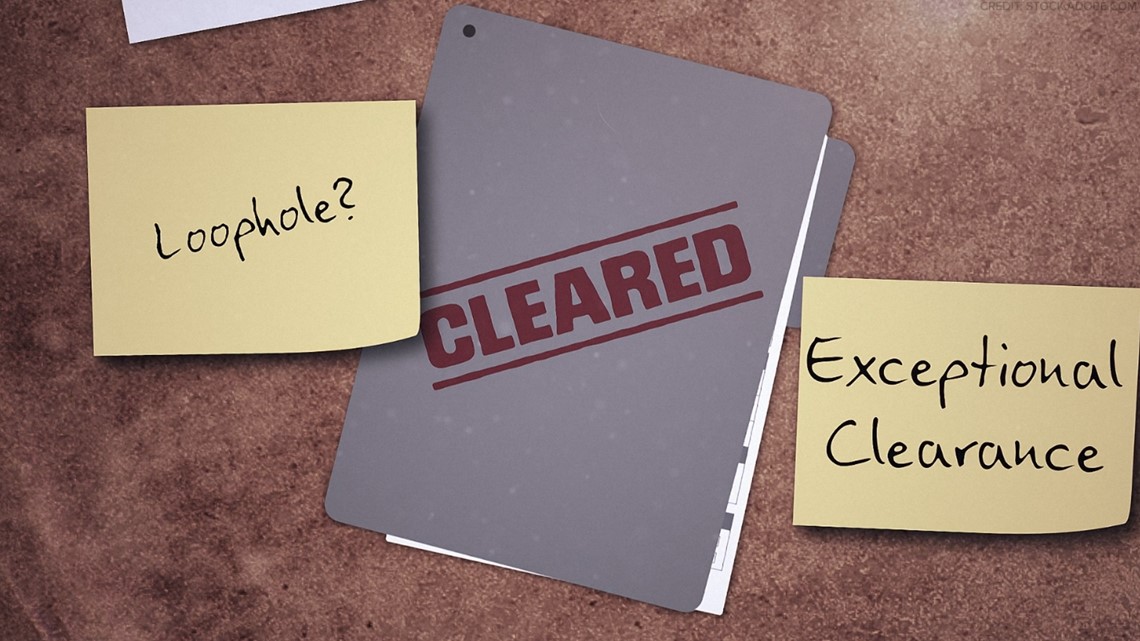
When Exceptional Clearance can be used
Exceptional clearance allows law enforcement to close crime investigations due to reasons outside of their control.
However, the three most important requirements they must meet to use the clearance code, including in sexual assaults and rapes, are:
- The offender must be identified.
- The offender’s exact location must be established, so they may be taken into custody.
- The investigating law enforcement agency must gather enough evidence to support the arrest, make a charge, and turn the offender in for prosecution.
Examples of circumstances preventing arrests to mark cases exceptionally cleared are:
- The offender has died.
- The victim’s refusal to cooperate with the prosecution after the offender has been identified.
- Denial of extradition because the offender committed a crime in another jurisdiction and is already being prosecuted for that offense.
Why it matters
Exceptional clearance should be used sparingly, according to criminal justice experts, as it is a case closure designation used when arrests and/or prosecution are next to impossible.
Some say anything above the 9% usage rate is alarming.
Our investigation shows not only how many Georgia law enforcement agencies are heavily relying on exceptional clearance to clear reported sex crime cases, but also misusing it as well.
To the public, it can appear that law enforcement agencies are better at solving sex crime cases than they are, leaving victims and their loved ones in limbo.
It also means potential offenders are walking free.
“Under exceptional clearance, the public is under the false impression that we have solved a crime and a rapist has been held accountable,” Liz Donegan, a retired Austin Texas Police Sergeant, told 11Alive. “And that's where the real danger comes in.”
How we did it
The team set out to find the use of exceptional clearance in sex crimes and why it was being used.
In the United States, there are thousands of individual law enforcement agencies.
In 2021, Georgia had an estimated population of more than 10.7 million people in 159 total counties, according to the U.S. Census Bureau. We took a comprehensive look at counties within the state that fell into areas that are Metropolitan, Micro-metropolitan, and rural areas.
In our analysis, we chose 48 out of 159 total counties (30%) for a comprehensive overview for this project.
That included:
- 17 metro counties
- 23 micro-metro counties
- 8 rural counties
Of the counties selected for our research, the team then tracked down each city or municipality within those areas to connect with individual law enforcement agencies.
The team spent more than a year contacting 149 individual law enforcement offices and departments about the total number of sex crime cases reported to them in 2021 and their case closure statuses.
Thirteen agencies could not be reached, despite repeated attempts by the team.
Here’s what we found:
What's the impact
Our ongoing investigation – An Exceptional Problem – is one of the first of its kind, specifically focused on how Georgia law enforcement agencies are using exceptional clearance in sex crime investigations.
Currently, there is no local or national oversight on how law enforcement uses exceptional clearance to close cases.
“There is nothing that is holding agencies accountable that don't [use exceptional clearance] appropriately unless it comes from the media or it comes from groups within the community that are asking for police accountability,” Donegan said.
High rates and the misuse of case closure, can become a public safety issue for all communities, according to experts.
“Well, first it’s a disservice to victims. Secondly, it’s a disservice to the community. This is the polar opposite of keeping the community safe,” said David Thomas, program manager with the International Association of Chiefs of Police.
“[The misuse of exceptional clearance is] sending the wrong message to the community. You know, we’re entrusted with conducting complete internal investigations and holding offenders accountable if we have probable cause to make the arrest. And people who are clearing cases exceptionally are telling the public we have probable cause to hold this rapist accountable, but something is precluding us from making this arrest - that’s the reality,” Donegan told 11Alive. “But the public, in general, doesn't understand what the reality is. So you’re allowing, in a sense, more rapists to go or a rapist to go unaccounted for when cases are cleared exceptionally.”

